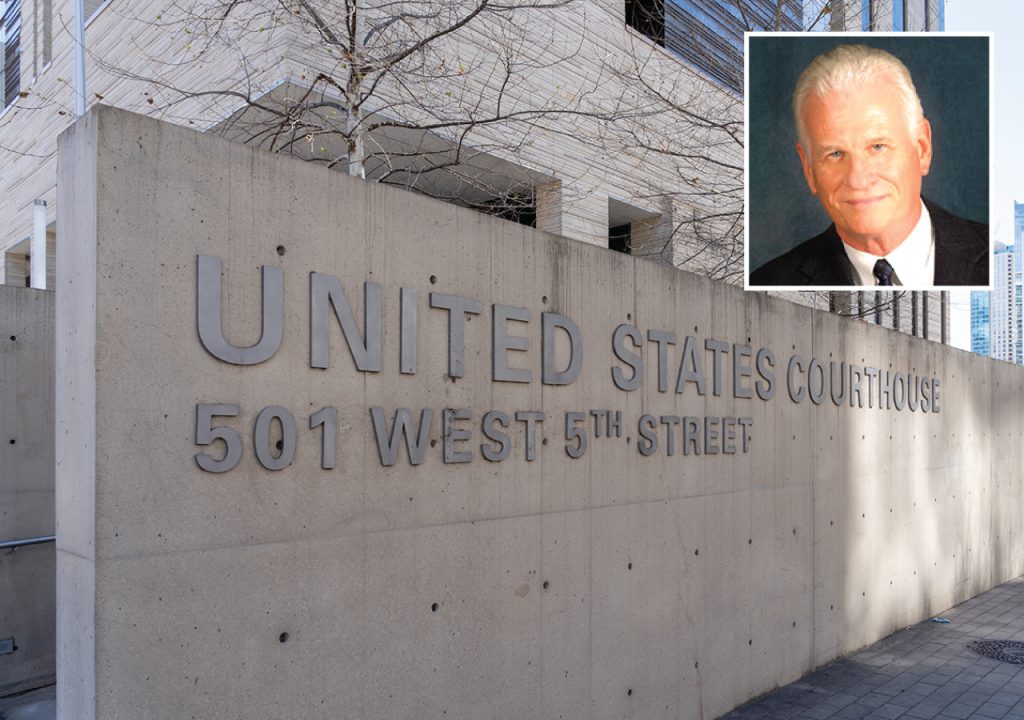Last of two civil suits against DA McAfee dismissed and settled

The U.S. Federal Courthouse in Austin, where the U.S. District Court for the Western District of Texas Austin Division presides. INSET: District Attorney Wiley “Sonny” McAfee of the 33rd and 424th judicial districts, which include Burnet, Llano, San Saba, and Blanco counties.
A civil lawsuit against 33rd/424th District Attorney Wiley “Sonny” McAfee was dismissed with prejudice on Wednesday, Feb. 20, meaning the plaintiff cannot refile on the same charges.
Zachary P. Hudler v. Wiley McAfee et al. was settled out of court and was the last of two lawsuits that named the DA, his investigator Jack Schumacher, Blanco County Sheriff’s Deputy James Loving, Blanco County Sheriff’s Sgt. Adam Acosta, and Blanco County as defendants.
The other lawsuit, Jarrett Jay Bous v. McAfee et al., was dismissed by U.S. District Judge Robert Pitman on Dec. 28, 2023, at the plaintiff’s request, also without prejudice. Bous stated in an Unopposed Dismissal by Stipulation submitted by Hudler, his attorney, that he “no longer wishes to pursue this action.”
The request to dismiss Bous v. McAfee came less than three months after Bous’ original attorney in the civil suit, Tanner Franklin of Franklin Law in Etoile, asked to be removed as counsel.
Both cases were related to the 2020 killing of James Robert Poole in Blanco County. Bous was charged with first-degree murder with bail set at $3 million. He spent eight months in jail before the charge was dismissed.
In his lawsuit, Bous claimed he was arrested despite evidence that exonerated him, that his bond was set too high for him to make bail, and that he was denied due process and equal protection under the law.
Hudler served as Bous’ defense attorney in the murder case. Hudler was arrested for evading a search warrant for his mobile phone.
In his suit against McAfee and Blanco County, Hudler claimed he was not shown a search warrant when asked for his phone and was thrown to the ground and handcuffed in public for refusing to turn it over.
In a statement submitted to DailyTrib.com concerning the Hudler settlement, McAfee called the civil suit “vexatious.” It was settled by the Texas Association of Counties’ attorneys for one-tenth of the original claim of $250,000 in damages. TAC represents Blanco County and provides insurance for the county.
“TAC agreed to pay Hudler $25,000 as a settlement with no finding of liability on the part of the parties sued,” McAfee said. “TAC settled without any input from us (defendants), whatsoever. Although I understand lawsuits and TAC’s decision to avoid paying more in additional legal fees than the settlement would cost, I don’t like it.”
Hudler told DailyTrib.com the lawsuit was about accountability, which he believes was achieved in the settlement.
“Cases like this are important because they are about holding government officials accountable,” he said in an email to DailyTrib.com. “This case brought about changes as some of the defendants are no longer employed by (Blanco County) or not seeking re-election.”
McAfee confirmed that one of the deputies involved in the case, and whose name was later removed from the lawsuit, recently retired from the Blanco County Sheriff’s Office. The DA also acknowledged he is not seeking re-election after serving 12 years in office, but that he made that decision before Hudler filed his suit.
“Hudler’s lawsuit and the subsequent settlement had nothing to do with accountability, it was about money,” McAfee said. “The only thing his lawsuit accomplished was getting money from the organization that provides insurance to Blanco County to get rid of Hudler’s vexatious lawsuit with no finding of liability.”
Legal costs were mounting as attorneys continued to conduct depositions, draft motions, and answer interrogatories and requests for admissions, McAfee continued.
“After discovery was complete, lawyers representing Blanco County filed a motion for summary judgment,” he said in his statement. “The motion essentially asserted that Hudler’s claim would fail based on evidence produced through discovery, including Hudler’s deposition. I believe the law firm representing the county very clearly demonstrated the lack of merit in Hudler’s lawsuit. “
In granting the Order of Dismissal in Hudler v. McAfee, Judge Alan D. Albright stipulated that each party would be responsible for paying their own attorney fees and costs.

